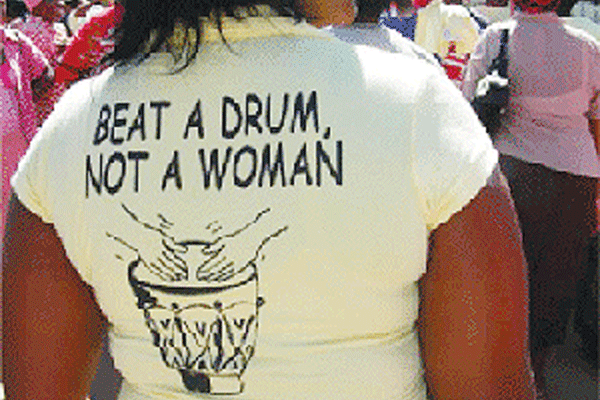
TOBIAS Mudzingwa (not real name) returns home in a drunken stupor on a Sunday morning.
BY JAIROS SAUNYAMA
This did not go down well with his wife Sarah, who accused him of squandering all their hardearned money from the tobacco sales on beer.
A fight erupted and, in his drunken state, Mudzingwa (42) was overpowered, beaten thoroughly and sustained some head injuries.
Upon arriving at the local clinic to get treated the following morning, Mudzingwa lied to the nurses that he had fallen while coming from a beer binge.
Despite the local police post being a few kilometres from his homestead, the domestic violence victim spent the whole week indoors, hiding from friends who would probe him about his “fall”.
Mudzingwa is one of many Zimbabwean men in the country who are victims of gender-based violence (GBV), but are failing to come out in the open due to a number of reasons, chief among them their cultural beliefs.
“Men are socialised not to cry when in pain. They say act like a man, do not cry. So, many bottle up such issues and never file a police report over such issues. Some turn to suicide ultimately. Culturally, it is laughable that a man is being harassed by a woman,” said 75-year-old Nyore Maramba of Wedza.
- Chamisa under fire over US$120K donation
- Mavhunga puts DeMbare into Chibuku quarterfinals
- Pension funds bet on Cabora Bassa oilfields
- Councils defy govt fire tender directive
Keep Reading
GBV is the general term used to capture violence that occurs as a result of the normative role expectations associated with each gender, along with the unequal power relationships between the two genders, within the context of a specific society.
However, in Zimbabwe GBV has been regarded as one-sided, with women being the most affected while men suffer in silence.
Social commentator, Admire Mare said cultural constructions hinder men from coming out in the open and report their cases as victims of GBV.
“A number of factors hinder men from coming out, such as cultural constructions of manhood and fatherhood which priviledge bravery over emotions. Coming out in the open is associated with being weak, yet suffering in silence is even worse, because of psychological wounds it hides.
“Some men are walking wounded by GBV like women, just because they want to live up to the dictates and the ideology of masculinity. Men, just like women, are abused every day,” Mare said.
According to a study by the Peace Research Institute of Oslo, men are more likely to be killed during conflicts, while in most cases women die of indirect causes after the conflict is over.
Men and boys are often seen as potential soldiers and fighters in conflicts — and thus a threat to the opposing side — due to the socially attributed role given to men.
Padare programmes officer, Ziphongezipho Ndebele said men were afraid of reporting cases of abuse by women.
“Socialisation, thus Machoism is reinforced as one grows, for example men do not cry after being abused by women. The society expects men not to show their emotions, except anger which is associated with masculinity,” he said.
“The challenge we have as a country is that men are afraid of reporting cases of abuse especially done to them by women.”
However, Ndebele added the majority of the abuses are perpetrated by men against women.
The Zimbabwe Demographic Health Survey shows the prevalence of GBV stands at 47% among women.
According to UNFPA, in Zimbabwe, about one in three women aged 15 to 49 have experienced physical violence and about one in four women have experienced sexual violence since the age of 15.
However, it has turns out that men are also victims of the same abuses, but the statistics are taken as low, given how they are not reporting the cases.
Katswe Sistahood director, Talent Jumo said it is the patriarchy system that puts a lot of pressure to live up to certain standards of manhood.
“Patriarchy, the very system that fuels oppression against women, places a lot of pressure on men to live up to certain standards of manhood,” she said.
Jumo added, “Men are expected to be dominant and powerful, whereas the woman is expected to be passive. So when men find themselves in violent relationships they can’t speak out for fear of being ridiculed. There is nowhere to go, because society is biased and believes women are the weaker sex, who need protection.”
“So even when men create organisations, in most cases they are talking about “rescuing girls and women” without recognising there are men and boys out there who need help. All this is rooted in the belief that men are stronger and will conquer.”
Jumo said the most GBV and torture in relationships is experienced by women and girls.
According to the EU-wide Survey on Violence against Women conducted by the EU Agency for Fundamental Rights, 22% of women have experienced some form of physical and/or sexual violence by a current or previous partner.
Forms of GBV are classified as both direct and indirect. Direct violence against women includes physical, sexual, psychological, and economic violence.
Indirect violence can be understood as a type of structural violence, characterised by norms, attitudes and stereotypes around gender in general and violence against women in particular.
Today, men continue to suffer silently despite being victims of gender based violence.
Many civil society organisation carry out campaigns during the 16 Days of Activism agant GBV











